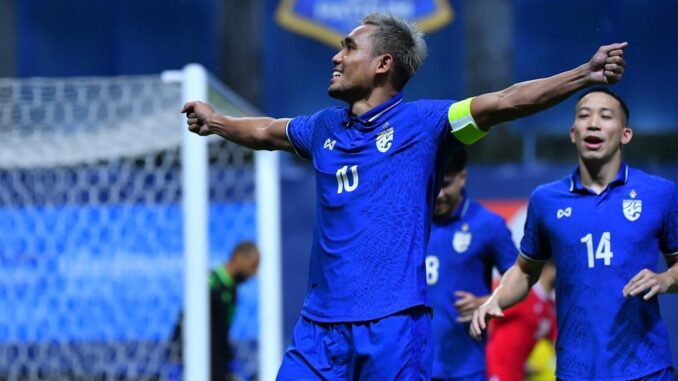
This coming week greets the culmination of Asian Cup 2023 qualification with the final round of qualifiers set to take place across the continent.
Three years in the making, one sizeable pandemic-shaped-inconvenience navigated, the competing field is nearly complete, for a continental showpiece we don’t even know when or where it will take place, following China’s hosting withdrawal two weeks ago.
Thirteen nations booked their ticket to the forthcoming Asian Cup last June, twelve months later the final 11 spots are due to be decided in the intense style of a three-match round robin neutral hub format that we all wish had already been condemned to the scrap heap.
In typical AFC fashion, progression isn’t wholly straight forward either. Given Qatar’s World Cup hosting later this year, minor adjustments are required in the final stages. Across the six groups, each winner guarantees qualification, alongside the five best runners up; leaving one unlucky second placed team to narrowly miss out on the Asian Cup.
If that’s the bad news, the good news sees the full continental field (or 95% of it) still in contention. Whether you like it or not, that a side such as Taiwan, who have lost every one of their eight qualification matches so far, can have their slate cleaned to still potentially qualify over the course of a week, does keep things open until the dying moments.
There is also some good to be had from keeping with a neutral hub set up; with six developing nations being afforded an opportunity to host their very own small-scale AFC tournament, a testing ground for future events, but also a key stake in the ground to promote interest in the game at national level.
Jordan & Kuwait meet again, hoping for a better outcome this time around
Group A – Jordan, Kuwait (host), Indonesia, Nepal
Following on from their ultimately unsuccessful pursuit of Australia in the Second Round, Jordan and Kuwait return to face each other once again, in their challenge for Asian Cup qualification. While the squads and fans will be all too aware of one another, it’s no surprise given both side’s penchant for a rotating dugout door, that they line up with new coaches at the helm.
For Jordan, last summer’s World Cup qualification exit brought to an end the polarising reign of Belgian coach Vital Borkelmans. The coach, who guided the team to a knockout stage defeat to Vietnam at the Asian Cup in the United Arab Emirates, honed a reactive, counter-attacking playing style that brought out the very best of his squad, in particular against more dominant, possession focused teams, as was demonstrated against Australia in the opening match day back in 2019.
While he masterminded an approach that challenged Asia’s elite, Borkelmans’ critics pointed to ineffective and one-dimensional attacking play, when they were implored to take the initiative. No goals were scored against the top two in their group in the Second Round, illustrating their inability to create open play opportunities, increasingly frustrating given the blossoming young talent of Musa Al-Taamari and Baha’ Faisal coming through at this stage.
In Borkelmans’ wake, Iraqi Adnan Hamad returns to the top job following an earlier spell in charge a decade ago. Hamad has already re-instilled a little more of a gung-ho approach to Jordan’s attacking display, if not as structured as Borkelmans before. Following a solid Arab Cup campaign at the end of last year, positive performances against India and Australia on the run up to this month’s action has buoyed spirits.
Kuwait themselves have rolled the dice in turn, moving for former Sydney FC coach Vitezslav Lavicka as their new manager. The well-liked coach enters a team failing to embrace full transition; still entrenched with a golden generation still forming the backbone of the side. Bader Al-Mutawa, now 37, alongside Yousef Nasser remain the goalscoring threat, while there are fewer options to replace the ageing legs of Amer Al-Fadhel and Fahad Al-Ansari.
The difficulties for both sides has been in finding an added spark in tight contests. It’s no surprise that both encounters in the Second Round between these two finished 0-0, a winner from either side in either contest would have continued their future in World Cup qualification. With their head-to-head slated for the final matchday; could lightning strike twice, with one (or more…) of these two nations edged out of progression once more, by lack of a telling killer sucker punch?
From footballing backwater, to final round host – the rise of Mongolia
Group B – Palestine, Philippines, Yemen, Mongolia (host)
Any one team remaining in Asian Cup qualification is a mere three matches away from a place in the finals come 2023. A remarkable opportunity for any potential debutant, even more so for a nation like Mongolia, previously living on their often-clichéd nomadic periphery, now in the host’s chair and dreaming of the once inconceivable.
It’s been over 20 years since Mongolia were last able to sink their teeth into the qualification cycle proper; each campaign since they have exited in the preliminaries with little traction to build upon, lost in a puff of smoke. This time around, a campaign that’ll take them through 13 matches in total has sown the seeds for a real evolution in their national football landscape, crucially being witnessed at home for all its high points.
While many predicted a unanimous humbling following their early progression to qualification proper, three wins from ten has proved their capability to upset those just ahead of them; scoring the first goals in the entire tournament in the First (in their first win over Brunei) and Second Rounds (their next, against Myanmar), Mongolia set the tone as the neutral favourites early on.
Following the worldwide lockdown that greeted mid-2020 however, so did the stagnation of national football development. Out went inspirational German coach Micheal Weiss, who had been integral to their recent growth. Out went a sense of balance, with the loss of a potential foothold in being able to host home matches for the next two years.
Demoralising defeats to Japan and Myanmar sealed their fate before the June round-robin in Chiba swung round; a 14-0 hammering at the feet of their hosts once more threatened to leave a lasting impact on their return to this level. Victory over a COVID-ravaged Kyrgyzstan, however, gained some heart, as they head into June under the tutelage of their fourth coach in four years, Japanese Otsuka Ichiro.
They aren’t the only team in Group B to have switched coaches within the last year either, with Scott Cooper stepping out of the Philippines hot seat a week before the qualifiers resumed. In comes a familiar face in American Thomas Dooley, but he’s already brought with him yet more upheaval, already splitting the fanbase having failed to call up captain Stephan Schrock and reportedly signing off his side’s home training camp with defeat to the domestic league All-Stars.
Each team lining up in the group has their own backstory and troubles over the qualification cycle thus far, leaving no real big fish that will likely stamp their influence on proceedings. If there was an opportunity for Mongolia to rise to the occasion, this could well be it.
The rising form of Thailand
Group C – Uzbekistan (hosts), Thailand, Maldives, Sri Lanka
A year on from their capitulation in the Emirates that saw them eliminated from World Cup qualification, and thus not being able to replicate their final round feat of four years ago, Thailand quickly look a team rejuvenated to edge their Asian Cup qualification hopes over the line; a much-needed boost that managerial change and regional success can muster.
Southeast Asia can resemble its only continent within a continent when it comes to its football; ever more so as four SE Asian nations squared up against one another alongside UAE in the Second Round of World Cup qualification last year. The inward focus and momentum that it brings is unmatched across Asia, with tales of success and decline sometimes playing off the continental books entirely, intensifying primarily at regional level.
As UAE predictably galloped to victory in qualification thanks to home advantage, that all important driver of momentum and an exciting squad full of talent, Southeast Asia trailed in their wake. Vietnam headed the bunch, making it through to the final round of World Cup qualification for the first time, under the evangelistic Park Hang-seo. While Malaysia punched above their previous weight for much of the campaign, it was Thailand who exited meekly.
A rigid, organised setup instilled by Akira Nishino did nothing for the War Elephants’ prospects in June, going on to pick up only one point from nine in the Emirates to eventually finish in fourth and way off the pace. The team lacked goals, excitement, and a clear way forward. From day one Nishino’s approach promised only a short reign, and that materialised; the Japanese coach exited in place for Brazilian Alexandre ‘Mano’ Polking to ascend.
The change in direction fell nicely ahead of the Suzuki Cup in Singapore. With Vietnam starting their latter round World Cup qualification slowly, Thailand had the chance to rebuild advantage, and did so with vigour, beating Vietnam 2-0 on aggregate in the semis, before clinching a third regional title in four editions against Indonesia in the final. Polking’s side didn’t necessarily feel revolutionary, but he did return Thailand to the side that promised so much six years ago.
The blossoming attacking riches of Chanathip Songraskin, Teerasil Dangda and Supachok Sarachat were back to their firing best, while there were some monumental defensive displays from the newly introduced Kritsada Kaman and Manuel Bihr that helped them over the line. Polking, with his enthusiasm for the task, had turned what had been a recent downward spiral into regional success effectively overnight and thus raised optimism heading into this final round of Asian Cup qualification.
They head to Namangan, Uzbekistan, with a favourable draw on paper. Yes, Uzbekistan, also headed by a new coach Srecko Katanec are favourites, but drawing Maldives and Sri Lanka does offer the opportunity for both of the established nations to make headway and look to near enough guarantee progression before their final match shootout. The only concern, as may be replicated in the Uzbek ranks, is complacency in what boils down to three cup finals; with an added layer that one unlucky side will not progress as a best runners up.
In addition, Polking’s squad is bereft of much of the talent December’s Suzuki Cup success was built on. Chanathip is out injured, as is Supachai Chaided who had been picking form of late; but it could be the late withdrawal of Supachock, as he finalises his switch to the J.League with Consadole Sapporo that could prove the telling blow.
With the Nishino spell still looming large, it must be accepted goalscoring hasn’t been the most reliable for Thailand over the last few years, and with some of their successful cohort, including key players that guided their side to the SEA Games final last month, elsewhere in Uzbekistan at the U23 Asian Cup, June’s qualifiers aren’t going to be a cake walk.
With new coaches in toe, expectation is high for both Uzbekistan and Thailand, yet with a short-fire schedule and a trap door still wide-open to swift elimination, there are few certainties to hold dear heading into this final round.
Stimac looking for qualification, and a new contract
Group D – India (hosts), Hong Kong, Afghanistan, Cambodia
Another World Cup cycle passes by, as another Indian national team contends with mounting national pressure while steering their ship towards a return to the Asian Cup. There is a sense of déjà vu in the progress of India across the last four years, which leaves them consistently placed as arguably one of the better sides developing outside the top tier, but crucially lacking the prospect of breaking the glass ceiling anytime soon.
The public reaction has similarly replicated the national team’s performances. Four years ago, Stephen Constantine was hounded out of his job, following an often impressive, but ultimately fragile Asian Cup campaign that ended in the group stages. The mounting pressure swelled over a tale of two halves qualification campaign, that threatened to derail in the first half before bringing back respectability in the latter.
His successor, Igor Stimac has had similar misfortunes. There were more high points in the initial stages of qualification, including a commendable draw against Qatar, but despite finishing third behind Qatar and Oman, who progressed to the next latter stages, there was little hiding the fact they trailed their peers by 11 points, having only acquired one victory in eight matches. An unbeaten SAFF title did little to satisfy the calls for improvement from outside.
Stimac’s philosophy has run in direct opposition to Constantine’s. He’s cemented a defensive steel they didn’t acquire before. They were one of the top ten defences in early qualification, however lost the plot in front of goal, netting only six times in eight matches. Over reliance on the talismanic Sunil Chhetri, who’ll be pushing 39 by the time the next Asian Cup rolls around, is starting to look desperate; not a single active player has made it past five goals in Indian blue aside from Chhetri.
Stimac’s inflexibility with his squad has also brought criticism, with grave concerns about the team’s exploits if they were to be successful in qualifying for 2023. The pivotal players remain integral to any success; from Gurpreet Singh in goal, through Sandesh Jhingen in defence, Anirudh Thapa in midfield and the aforementioned Chhetri in attack. It leaves little room to manoeuvre for injury or a drop off in form.
With Stimac’s contract up this summer, pressure will not just be on acquiring results but to create a more positive, convincing display in front of an expectant crowd in Kolkata, a tougher assignment than it first appeared on paper when the draw was made.
They face some real unpredictable tests. Afghanistan, a team they struggled against last round, who of course are experiencing terrible circumstances at home, Cambodia currently under development with Keisuke Honda at the helm, and Hong Kong, who despite witnessing national champions Kitchee make the AFC Champions League knockout stages earlier this year, have seen their domestic league decimated by COVID, with the national team having only just resumed activity.
On paper, Group D pits four teams in varying states of ill-form, disarray and rebuild against one another. The fact that at least one has to qualify for 2023 gives hope, but little assurance that the future is necessarily going to be brighter than their recent past.
New coach aims to relight the promise of a return to the Asian Cup
Group E – Bahrain, Turkmenistan, Malaysia (hosts), Bangladesh
Fifteen years since their last Asian Cup appearance as joint-hosts, Malaysia’s rise over the course of qualification has been impressive. Yet a mediocre Suzuki Cup showing to end 2021, resurgent conflict within the fanbase and a hotly debated managerial change, the Malayan Tigers head into their bid to return to the continental showpiece with a tough task ahead of them.
The typical trajectory of Malaysian football, that ebbs and weaves rapidly with every given month didn’t stray too much from the theme this cycle. Emphatic in its commencement – headlined by victories over Indonesia and Thailand in late 2019, before ultimately being cut short in last June’s final run in as the established order came to the fore.
The takeaways were overly positive – Tan Cheng Hoe had developed a forward thinking, attacking team with quality in the final third that showed no fear against elite opposition.
With Asian Cup qualification looking a better proposition, December’s Suzuki Cup did fail to kick on the momentum. Disappointment in their group stage elimination saw Tan exit under pressure, leaving Malaysia in a little bit of uncertainty heading into the final stages of what has been an impressive period for the national team.
Opinion continues to be split on the team, from the highly controversial adoption of nationalised players – let alone the previous inclusion of expatriates – to the initial concern of the incoming Korean coach Kim Pan-gon, the furore around Malaysian football has steadily become toxic.
The success of powerhouse Johor Darul Ta’zim in the AFC Champions League earlier this year did little to bring together both sides of the debate, with some arguing that JDT’s meteoritic climb came at expense to local football, built on money and overseas imports.
Heading into this month, however, the key players continue to hail from the Malaysian champions. Safawi Rasid and Matthew Davies are the key difference makers in the side, while Mohamadou Sumareh and Guilherme have the potential to tip the balance despite some erratic form of late. Malaysia, while hosts, do enter as third seeds in the groups, however, odd to think given the relative optimism behind their campaign.
Bahrain, unfortunate in being edged out by Iran and Iraq in the Second Round, start as favourites, while Turkmenistan, despite being cast into the COVID wilderness more than most over the last 18 months, have recently returned to overdue domestic football and have instilled some solidity in experienced coach Said Seyedov.
Bangladesh, a side still in transition now under Javier Cabrera, also offer a potential spanner in the works if Malaysia hit one their typical bouts of frustration.
Interest will be piqued given the history at play. With positive friendly performances suggesting they have turned a corner under Kim, Malaysia need to maintain and execute their potential to live up to a campaign that deserves a fitting ending.
Einstein looks to guide Tajikistan’s golden generation to a debut Asian Cup
Group F – Kyrgyzstan (hosts), Tajikistan, Myanmar, Singapore
One of the favoured debutants to potentially qualify for the next Asian Cup comes in form of Tajikistan, a nation who’ve dominated the peripheral news of both domestic and international football in Asia over the last few years.
From their domestic champions Istiklol generating AFC Champions League history last year, usurping continental champions Al-Hilal to make it to the knockout phase, to running within a point of progressing to the final round of World Cup qualification, it’s been a highly successful period for the Crowns of Dushanbe.
The last twelve months however have sought to dampen expectations. The capitulation and infighting that greeted their Second Round culmination last June, a managerial walkout, with Istiklol struggling in their return to the Champions League this term, fans of Tajik football will hope that their recent disappointments won’t knock them off course from securing a debut Asian Cup appearance in the coming week’s qualification stage.
The squad that resembles the country’s first Golden Generation remains one of the best on the fringes of Asian football; developed in tandem through Uzbek coach Usmon Toshev at national level and recently Vitaliy Levchenko at club level with Istiklol, the talents of Manuchehr Safarov, Vahdat Hanonov (now both at Persepolis), Ehson Panjshanbe (now in Uzbekistan) and the immortal Manukekhr Dzhailov have shone over the last few years.
One point separated them from progressing to the final round of World Cup qualification, ultimately lost in a 1-1 draw with regional rivals Kyrgyzstan, who they face once again this June. A management relationship breakdown saw Toshev walk away, paving the way for the arrival of self-labelled “Einstein” lookalike Petr Sergt to take over the national team.
Early days have felt a little erratic. March’s Navruz Cup included a disappointing penalty defeat to Uganda, followed by a narrow but intensely fierce victory over regular opponents Kyrgyzstan. March’s “friendly” encounter saw both teams end the match with nine men a piece, pre-empting a dangerously poised return fixture when they meet once again in Bishkek next week.
Kyrgyzstan themselves are recovering from their own drop off in performance. They are arguably four years ahead of Tajikistan, in making their Asian Cup debut in 2019. Their progress under coach Aleksandr Krestinin has been noteworthy, yet despite a number of talents heading to Europe – in particular creative midfielders Gulzhigit Alykulov in Kazakhstan and Alimardon Shukurov in Belarus – results for the national team have taken a backwards step.
With the top two in the group likely, but crucially not guaranteed to progress to the Asian Cup, neither of these sides will be shy in denting their rivals a chance of qualification.
Despite being drawn as favourites, they once again face Myanmar also, who posed a significant threat during the last round of qualification, placing Group F in a precarious position. One way or another, the group promises fireworks and potentially some broken hearts.
Main Photo: twitter/Changsuek_TH
Listen to Episode 86 of The Asian Game podcast as we’re joined by Rhysh Roshan Rai and Martin Lowe to preview Asian Cup qualifying




